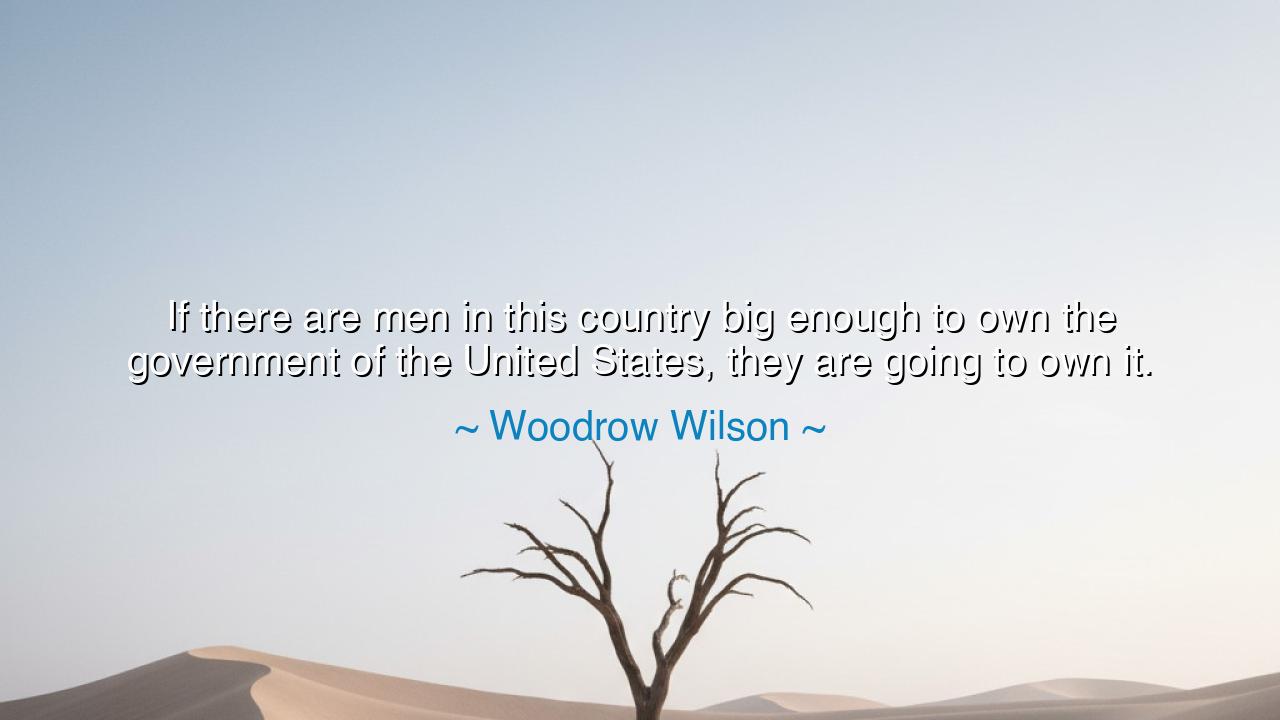
If there are men in this country big enough to own the government
If there are men in this country big enough to own the government of the United States, they are going to own it.






In a moment of piercing clarity, when power and morality stood face to face, Woodrow Wilson, the 28th President of the United States, uttered these chilling yet prophetic words:
"If there are men in this country big enough to own the government of the United States, they are going to own it."
These words, born in an era of industrial might and financial domination, were not spoken as resignation but as warning — a lament for the republic he served and a mirror held up to the ambitions of men. Wilson, who had witnessed the rise of vast corporate empires and banking interests during the dawn of the twentieth century, understood a truth as old as civilization itself: that wealth, left unguarded by conscience, will always reach for power, and that once power is seized, it seldom lets go. His words are not an indictment of prosperity, but a plea for vigilance — for the soul of democracy can be bought not with armies, but with gold.
The meaning of his declaration is both simple and eternal. Power follows wealth, as the river follows gravity. When a few men or corporations grow so vast that they can bend the laws to their will, the balance between ruler and ruled begins to collapse. The people cease to be citizens and become subjects — not to a king crowned by divine right, but to an aristocracy of money, enthroned by profit. Wilson saw this danger unfolding before him in his own time. The rise of powerful trusts and monopolies — railroads, oil, steel, and banking cartels — had made a mockery of political equality. The government, meant to serve all, had begun to serve a few. Thus, he spoke these words not as despair, but as a call to arms for the spirit of democracy itself.
The origin of the quote lies in the tumultuous years of Wilson’s presidency, when America stood at the crossroads of modern capitalism and moral governance. The Gilded Age had produced immense fortunes and immense suffering. Men like John D. Rockefeller, J.P. Morgan, and Andrew Carnegie controlled vast sectors of the economy, influencing elections, dictating laws, and shaping public policy through wealth. To challenge them was to risk ruin; to ignore them was to invite tyranny. Wilson, a scholar before he was a president, understood that unchecked power in private hands would soon eclipse the authority of the state itself. His words emerged as a warning: if wealth became mightier than justice, the republic would become an illusion.
History offers countless examples of this peril. In ancient Rome, the republic crumbled not when foreign armies breached its gates, but when its richest citizens bought the loyalty of the Senate and the legions. The state became their instrument; the people became their pawns. The same disease — the marriage of greed and governance — has haunted every age. Even in the industrial era, as wealth concentrated in fewer hands, the same pattern emerged: democracy decays not by conquest, but by corruption. Wilson, seeing these patterns repeat, knew that liberty cannot be preserved by mere law — it must be defended by the moral courage of the people who refuse to sell their freedom for comfort or gold.
Yet Wilson’s words are not meant to inspire despair, but responsibility. He reminds us that if tyranny arises from wealth, then liberty must arise from unity and vigilance. A government cannot be owned by the few when the many are awake, engaged, and unafraid. The people must demand transparency, fairness, and justice — not only in their leaders but in the systems that produce them. The antidote to concentrated power is participation: the constant renewal of the public spirit through education, moral conviction, and civic action. Democracy is not a gift one inherits; it is a garden one must tend. When neglected, it is overrun by the weeds of greed and the thorns of apathy.
Consider the story of Theodore Roosevelt, Wilson’s predecessor in spirit, who declared war upon the monopolies of his age. He broke apart the trusts, curbed the excesses of the powerful, and restored faith in the people’s government. He understood, as Wilson did, that the state must never be owned — not by kings, not by clergy, and not by capital. His courage rekindled the flame of fairness and reminded the nation that no man, however rich or cunning, stands above the common good. The lesson endures: that power, once challenged by virtue, can be tamed by law.
So let this teaching stand firm in the hearts of all who cherish liberty: the price of freedom is vigilance, and the cost of apathy is servitude. If men arise who are “big enough to own the government,” it is because the people have become small enough to sell it. Do not despair at this truth — take strength from it. For every age brings its own giants, and every age must produce its own defenders.
Thus ends the teaching: guard your government as you would your soul, for both can be stolen quietly while you sleep. Wealth and power are not evil in themselves, but when they cease to serve justice, they must be restrained. Let every citizen remember this — that democracy dies not when tyrants rise, but when free men forget they are sovereign.






AAdministratorAdministrator
Welcome, honored guests. Please leave a comment, we will respond soon